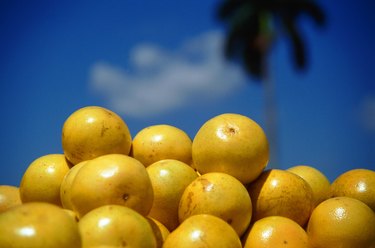
Grapefruit can change the way your body metabolizes many drugs. Because of this effect, you may have more side effects than usual if you take medications with grapefruit. While this effect does not occur with every drug, it could occur with tramadol, although drug inserts for the drug do not list this as a possible reaction. Ask your doctor about the potential effects of drinking grapefruit juice or eating any other grapefruit products while taking tramadol.
Causes
Video of the Day
The compounds that cause problems with drug metabolism appears to be furanocoumarins, found mostly in the grapefruit flesh but also in the sac, peel and seeds. These compounds inhibit the intestinal cytochrome P450 3A4 system, which plays an essential role in the first-pass metabolism of drugs as they pass through the liver and intestine. In first-pass metabolism, the potency of a drug is reduced in the liver. Grapefruit products inactivate the system, so that more of the active part of the drug passes through to the intestines for absorption. Tramadol undergoes first-pass metabolism; taking tramadol with CYP3A4 inhibitors may reduce metabolic clearance of the drug, according to Drugs.com.
Video of the Day
Effects
Consuming grapefruit products inhibits cytochrome P450 3A4 starting 30 minutes after ingestion and lasts for 24 to 72 hours, pharmacist Amy Stump reports in the August 2006 issue of the "American Family Physician." Grapefruit can increase cytochrome P450 3A4 concentration by up to 47 percent. Because more drug passes into the bloodstream, side effects intensify.
Dangers
Tramadol, a drug similar to opiates, reduces pain. Side effects include sedation, dizziness, confusion, nausea, vomiting, seizure, hallucinations, vertigo and tachycardia. If these effects intensify, they could lead to symptoms of overdose, including seizures, breathing difficulties, slow heart rate, flaccid muscles, extreme sedation or circulatory collapse.
Considerations
Drugs most affected by grapefruit are those that not only undergo first-pass metabolism but those that also have low bioavailability and those that have a narrow therapeutic range. If a drug has a narrow therapeutic range, even a small increase in the amount absorbed can cause problems. Tramadol has high bioavailability, between 70 and 90 percent, according to Margarete Fischer, M.D., of the German Bosch Institute of Clinical Pharmacology. She does add that inhibitors of drug metabolism could affect tramadol's metabolism. The safest bet is to ask your doctor whether you should avoid grapefruit products.
- "American Family Physician"; Management of Grapefruit-Drug Interactions; Amy Stump, Pharm. D., et al.; August 2006
- Opiates.com;Tramadol--the Impact of Its Pharmacokinetic and Pharmacodynamic Properties on the Clinical Management of Pain; Dr. Margarete Fischer
- Pharmacy Times; Drug Interactions with Grapefruit Juice: An Evidence-Based Overview; Sam Shimomura, Pharm.D.
- MayoCinic.com; Grapefruit Juice: Beware of Dangerous Medication Interactions; November 2010
- Drugs.com: Tramadol